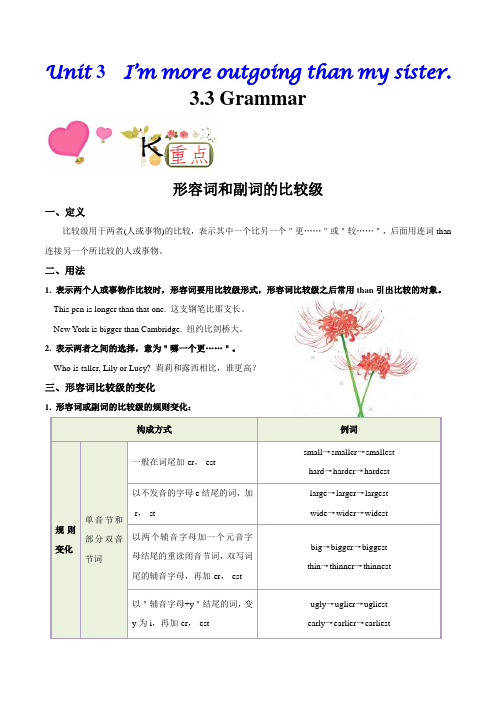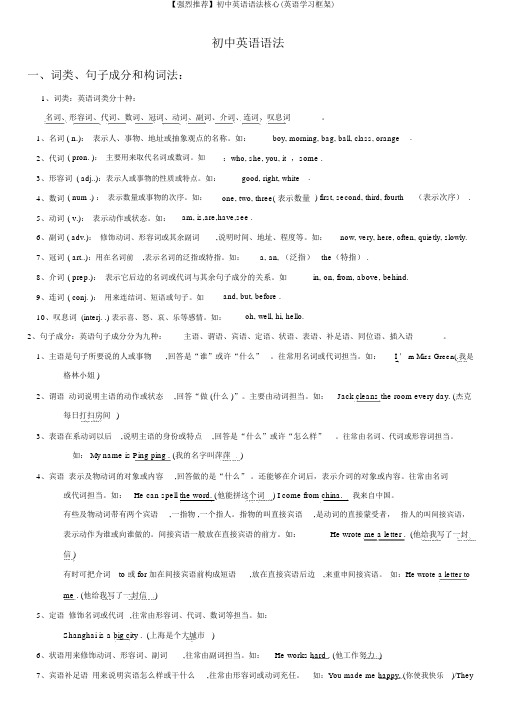强烈推初二英语语法全真精讲讲义
- 格式:doc
- 大小:206.50 KB
- 文档页数:47


Unit 3I’m more outgoing than my sister.3.3 Grammar形容词和副词的比较级一、定义比较级用于两者(人或事物)的比较,表示其中一个比另一个"更……"或"较……",后面用连词than 连接另一个所比较的人或事物。
二、用法1. 表示两个人或事物作比较时,形容词要用比较级形式,形容词比较级之后常用than引出比较的对象。
This pen is longer than that one. 这支钢笔比那支长。
New York is bigger than Cambridge. 纽约比剑桥大。
2. 表示两者之间的选择,意为"哪一个更……"。
Who is taller, Lily or Lucy? 莉莉和露西相比,谁更高?三、形容词比较级的变化1. 形容词或副词的比较级的规则变化:构成方式例词规则变化单音节和部分双音节词一般在词尾加-er,-estsmall→smaller→smallesthard→harder→hardest 以不发音的字母e结尾的词,加-r,-stlarge→larger→largestwide→wider→widest 以两个辅音字母加一个元音字母结尾的重读闭音节词,双写词尾的辅音字母,再加-er,-estbig→bigger→biggestthin→thinner→thinnest 以"辅音字母+y"结尾的词,变y为i,再加-er,-estugly→uglier→ugliestearly→earlier→earliest【记忆口诀】2. 不规则变化【记忆口诀】三、形容词比较级前的修饰词比较级前可以用much、a little、a lot、even、rather、still、any、a bit、far等词修饰,起强调作用,不可用very、so、quite、too(只能修饰原级)等修饰。
Believe me, you really look much better than before. 相信我,你看起来真的比以前好多了。

英语语法50讲第一讲:英语语法概述介绍英语语法的重要性:阐述语法在准确表达、理解英语句子等方面起到的关键作用。
语法体系的基本构成:提及词法(各类词性等)和句法(句子结构等)两大部分。
第二讲:名词(一)名词的分类:如可数名词(个体名词、集体名词)、不可数名词(物质名词、抽象名词)。
可数名词的单复数变化规则:常规加“s”“es”的情况,还有特殊变化形式等。
第三讲:名词(二)名词所有格:讲解’s 所有格的构成与用法,以及of 所有格的使用场景等。
名词在句子中的作用:可作主语、宾语、表语、定语等举例说明。
第四讲:代词(一)人称代词:主格(I、you、he 等)和宾格(me、you、him 等)的用法及区别。
物主代词:形容词性物主代词(my、your、his 等)和名词性物主代词(mine、yours、his 等)的不同运用。
第五讲:代词(二)反身代词:如myself、yourself、himself 等的常见搭配与表意。
指示代词:this、that、these、those 在句中的指代和用法特点。
第六讲:代词(三)不定代词:像some、any、many、much、few、little 等的用法差异,以及在肯定句、否定句、疑问句中的运用情况。
相互代词:each other 和one another 的用法举例。
第七讲:冠词(一)不定冠词a/an 的用法:用于泛指、表示“一个”等情况,以及 a 和an 根据后续单词发音来选用的规则。
定冠词the 的基本用法:用于特指、上文提到过的事物等常见场景。
第八讲:冠词(二)零冠词(不用冠词的情况):像在某些专有名词、球类运动、三餐等前面不用冠词的举例与说明。
冠词使用的一些特殊情况和易错点总结。
第九讲:数词(一)基数词的构成与读写:从1 到100 等的基数词表达方式,以及较大数字的读写规则。
基数词在句中的作用:可用于表示数量、年龄、编号等举例。
第十讲:数词(二)序数词的构成与用法:first、second、third 等的变化规律,以及序数词用于表示顺序等情况。

初中英语语法一、词类、句子成分和构词法:1、词类:英语词类分十种:名词、形容词、代词、数词、冠词、动词、副词、介词、连词、叹息词。
1、名词 ( n.):表示人、事物、地址或抽象观点的名称。
如:boy, morning, bag, ball, class, orange.2、代词( pron. ):主要用来取代名词或数词。
如:who, she, you, it,some .3、形容词( adj..):表示人或事物的性质或特点。
如:good, right, white.4、数词( num .) :表示数量或事物的次序。
如:one, two, three( 表示数量) first, second, third, fourth(表示次序).5、动词( v.):表示动作或状态。
如:am, is,are,have,see .6、副词( adv.):修饰动词、形容词或其余副词,说明时间、地址、程度等。
如:now, very, here, often, quietly, slowly.7、冠词( art..):用在名词前,表示名词的泛指或特指。
如:a, an, (泛指)the(特指) .8、介词( prep.):表示它后边的名词或代词与其余句子成分的关系。
如in, on, from, above, behind.9、连词( conj. ):用来连结词、短语或句子。
如and, but, before .10、叹息词(interj. .) 表示喜、怒、哀、乐等感情。
如:oh, well, hi, hello.2、句子成分:英语句子成分分为九种:主语、谓语、宾语、定语、状语、表语、补足语、同位语、插入语。
1、主语是句子所要说的人或事物,回答是“谁”或许“什么”。
往常用名词或代词担当。
如:I ’ m Miss Green(.我是格林小姐 )2、谓语动词说明主语的动作或状态,回答“做 (什么 )”。
主要由动词担当。
如:Jack cleans the room every day. (杰克每日打扫房间)3、表语在系动词以后,说明主语的身份或特点,回答是“什么”或许“怎么样”。

初中英语语法的一等奖说课稿《初中英语语法的一等奖说课稿》这是优秀的说课稿文章,希望可以对您的学习工作中带来帮助!1、初中英语语法的一等奖说课稿语法是英语学习总非常重要的内容,关于初中英语语法的说课稿有哪些?以下是小编为您整理的相关资料,欢迎阅读!一、教学目标学习反意疑问句二、教学重点通过教学让学生掌握反意疑问句的基本句型结构和回答。
三、教学难点1.主句谓语是think, believe, expect, suppose, imagine等引导的宾语从句,就从句部分提问。
2.陈述句部分主语是不定代词everybody, anyone, somebody, nobody, no one等,疑问部分常用复数they,有时也用单数he。
教学程序如下:初二下学期第十单元安排学习反意疑问句的教学内容一、说教学程序:导入——新知识的学习说设计这个教学程序的基本思路和根据。
就初二学生来说他们学习以下的语法项目:be动词(包括be 动词的过去时); There be句型;行为动词的一般现在时;行为动词的一般过去时;一般将来时;(包括There be句型的.一般将来时);现在完成时;现在完成进行时;情态动词和祈使句。
因此,我在讲授反意疑问句时,仅仅围绕学生学过的语法项目进行反意疑问句的教学并进行反复练习。
具体练习作业本(上、下)、典中点中的练习都有,另外,再补充总结有关反意疑问句的专项练习加以巩固。
二、说练习和作业的设计。
检测训练——总结巩固。
通过安排学生做作业本(上、下)中的练习、典中点中的练习进行训练,再补充总结性的有关反意疑问句的专项练习进行检测加以巩固。
三、说板书设计:通过课件展示教学的内容(以下各项教学内容)以下分为十一个部分进行讲解。
反意疑问句反意疑问句是由两部分组成的,前一部分是对事物的陈述(即陈述句),后一部分是简短的提问(即简短疑问句),中间用逗号隔开。
如果前一部分用肯定句,后一部分就用否定疑问句;如果前一部分用否定句,后一部分就用肯定疑问句。

八年级上册英语语法知识点讲解和练习(一)一般将来时一般将来时表示将来某个时间要发生的动作或者存在的状态。
通常与表示将来的时间状语连用,如tomorrow, the day after tomorrow, next year, next month, next week, in 100 years 等。
be going to do (动词原形)结构:表示打算、准备做的事情或者肯定要发生的事情。
如:It is going to rain, will do结构表示将来的用法:Do you think it will rain?You will feel better after a good rest.I will borrow a book from our school library tomorrow.What will she do tomorrow?基本构成如下:一般疑问句构成:(1)wi 11+主语+do."? Will Sarah come to visit me next Sunday?(2)there be 结构的一般疑问句:Will there + be …?Will there be fewer trees? Yes, there will. / No, there won’ t否定句构成:will + not (won’t) +doSarah won’ t come to visit me next Sunday.特殊疑问句构成:特殊疑问词+will+主语+…? What will Sarah do next Sunday?练一练根据例句,用will改写下列各句例:I don, t feel well today, (be better tomorrow)I’ll be better tomorrow.1.Gina has six classes today, (have a lot of homework tonight)2.I’ m tired now. (sleep later)3.My parents need a new car. (buy one soon)4.We can’ t leave right now. (leave a little later)5.The weather is awful today, (be better tomorrow)(二)should 的用法:should用来提出建议和忠告,后边加动词原形,否定句直接在should后边加not. 例如:I think you should eat less junk food.我认为你应该少吃垃圾食品。
(完整版)(整理)强烈推荐英语语法基础知识.doc英语语法基础知识 - 动词分类我们应该从三个方面了解一下动词的分类。
第一方面:按词义和句中的作用,动词可以分为四类。
见下表。
类别特点意义举例实义动词 (vt. 及物动词跟宾语须跟宾语一起才I have a book.. vi.) 能表达完整的意思不及物动词不能能独立作谓语She always comes直接接宾语late.系动词 (link-v) 跟表语不能独立做谓I am a student.语,跟表语构成完整意思助动词 (aux. v.) 跟动词原形或分不能独立做谓Hedoesn’t speak 词(无词汇意义)语,跟主要动词Chinese.构成谓语,表示I amwatching TV.疑问,否定及各种时态情态动词 (mod. 跟动词原形(有不能独立做谓We can do it by v.) 自己的词汇意语。
表示说话人ourselves.思)语气、情态,无That would be人称和数的变化better.第二方面:短语动词,短语动词是由一些动词和其它词构成短语,表达一个完整的意思。
其构成方式如下。
构成方式动词 +介词动词 +副词动词 +副词 +介词动词 +名词 +介词Be+形容词 +介词复杂结构举例Look at, look afterGive up, put intoCatch up with, look down upon Take care of, pay attention to Be proud of, be afraid ofMake up one ’s mind, wind one ’s way第三方面:按动词的形式可以分为谓语动词和非谓语动词。
1、谓语动词形式意义举例人称与主语在人称一致I am reading now. 第一人称数与主语在数上一致He writes well. 第三人称单数时态表示动作发生的时间He wrote a letter to melast month. 过去时态主语是动作的发生者或语态者承受者We study English. 主动The road was filledwith rubbish. 被动语气说话人表达事实、要求、He has flown to愿望等America. 事实I wish I could fly tothe moon some day. 愿望2、非谓语动词形式意义用途举例不定式起形容词和名词可作主语、表语、 It takes me 20作用宾语、定语、状语 minutes to go toschool.动名词起名词作用作主语和宾语She likesreading.分词现在分起形容词、副词作作表语、定语、状The cup is broken 词用,表主动语、宾语补足语过去分起形容词、副词作The steam is seen词用,表被动rising from thewet clothes.中学生英语学习常见错误-- 动词[误]She laid down and soon fell asleep.[正]She lay down and soon fell asleep.[析]考试中常出现的是易混动词lay 放, lie去时、过去分词和现在分词变化如下:lay ( 放 ) laid , laid , laying (及物动词)躺, lie 说谎。
(强烈推荐)初中英语语法宝典学习提纲一、词类、句子成分和构词法:1、词类:英语词类分十种:名词、形容词、代词、数词、冠词、动词、副词、介词、连词、感叹词。
1、名词(n.):表示人、事物、地点或抽象概念的名称。
如:boy, morning, bag, ball, class, orange.2、代词(pron.):主要用来代替名词。
如:who, she, you, it .3、形容词(adj..):表示人或事物的性质或特征。
如:good, right, white, orange .4、数词(num.):表示数目或事物的顺序。
如:one, two, three, first, second, third, fourth.5、动词(v.):表示动作或状态。
如:am, is,are,have,see .6、副词(adv.):修饰动词、形容词或其他副词,说明时间、地点、程度等。
如:now, very, here, often, quietly,slowly.7、冠词(art..):用在名词前,帮助说明名词。
如:a, an, the.8、介词(prep.):表示它后面的名词或代词与其他句子成分的关系。
如in, on, from, above, behind.9、连词(conj.):用来连接词、短语或句子。
如and, but, before .10、感叹词(interj..)表示喜、怒、哀、乐等感情。
如:oh, well, hi, hello.2、句子成分:英语句子成分分为七种:主语、谓语、宾语、定语、状语、表语、宾语补足语。
1、主语是句子所要说的人或事物,回答是“谁”或者“什么”。
通常用名词或代词担任。
如:I‘m Miss Green.(我是格林小姐)2、谓语动词说明主语的动作或状态,回答“做(什么)”。
主要由动词担任。
如:Jack cleans the room everyday. (杰克每天打扫房间)3、表语在系动词之后,说明主语的身份或特征,回答是“什么”或者“怎么样”。
完整)仁爱版八年级英语上册语法UNIT 1 Topic 1 语法精讲Be going to + 动词原形Be going to + 动词原形用于表示说话人根据现有的迹象判断将要或即将发生某种情况。
这种句子的主语可以是人或物。
例如:明天下午我们学校将有一场足球赛。
(已有告示)我感到难受极了,我想我快不行了。
看看那些乌云!天快要下雨了。
Be going to + 动词原形也用于表示主语现在的意图或现已作出的决定,即打算在最近或将来进行某事。
这种意图或决定往往是事先经过考虑的。
例如:他明天不准备去看他哥哥。
XXX决定长大了当一名教师。
Be going to + 动词原形还可以单纯地预测未来的事情,此时可与will互换。
例如:我认为今晚要下雨。
需要注意的是:1.Be going to 和 will 在含义和用法上略有不同。
Be going to 往往表示事先经过考虑的打算;will 多表示意愿、决心。
两者有时不能互换。
例如:他正努力研究,准备参加考试。
(不能用will替换)我来。
(不能用be going to替换)2.在 if 之后,通常不用will表示预言,但可以用be going to表示意图。
例如:你若今晚去看电影,最好带着外套。
Be going to 也常可以用于主句之中。
例如:如果你邀请XXX,那就会有麻烦。
在条件从句中,will 可以用作情态动词来表示将来的意愿。
例如:如果你愿意学踢足球,我可以帮助你。
以下是课堂小测:1、要小心,火车即将到来。
A。
will come B。
C。
comes D。
is coming2.看那些云,恐怕很快就会下雨了。
A。
is going to rain B。
is XXX3.收音机说后天会下雪。
A。
is going to snow B。
is XXX4.他明天下午会去买些东西吗?A。
Will…does B。
is going to do C。
is…doing D。
Shall… do第2页共15页UNIT 1 Topic 3 语法精讲随堂测试1、明天下午将会有一次会议。
最新初二英语语法真题讲义第二部分历届试题精选Unit 11. jack, good boy! Please pass ________ the glasses. I want to read the newspaper.A. youB. meC. himD. her2.This morning I had ________ egg and a bottle of milk for my breakfast.A. anB. aC. theD.不填冠词不定冠词定冠词上文提过的人或物Ji Wei lives on a farm. The farm is not big.独一无二The sun is bigger than the moon.序数词和形容词最高级前The first month of the year is January.普通名词构成的专有名词前The Great Wall习惯用语In the morningOn the left零冠词用法例句专有名词和不可数名词前China名词已经有定语this, that, my,your, some, any等That letter is in her bag.复数名词表示一类人或物My father and mother are teachers.星期、月份、季节、节日前It is Sunday today.称呼前What colour are Mrs. Green’s shoes?三餐和球类运动前He went to school before breakfast this morning.3. —How many ________ can you see in the following pictures?—Three.A. boysB. animalsC. filmsD. buildings4. Timmy goes to school ________ every day. It's 5 minutes' walk from his home to school.A. in a busB. by planeC. on footD. by boat5. Everything is ________ at night markets. You don't need a lot of money to havea good time.A. cheapB. badC. tiredD. dear6. —Excuse me, ________ is the nearest bookshop?—Go down the street and turn left at the second corner.A. howB. whatC. whereD. who7. The sign tells us ________.A. NO SMOKINGB. NO PARKINGC. NO PHOTOSD. NO FOOD8. —Can you play football?—Yes, I can, ________ I can't play it very well.转折关系A. orB. andC. soD. but9. Last month, students had to have their lessons by internet ________ because of SARS.A. on the playgroundB. at homeC. in the streetD. near the hospital10. It is ________ today than yesterday. Shall we go swimming this afternoon?A .the hottest B. hotC. hottestD. hotter最高级要加the,由于hot为重读闭音节所以要双写t加est。
11. Listen! Some of the girls ________ about Harry Potter. Let's join them!A. are talkingB. talkC. will talkD. talked出现listen,look等词,优先考虑使用进行时态。
12. ________ Chinese are looking for ways to learn English well before Beijing 2008 Olympics.A. ThousandB. ThousandsC. Thousand ofD. Thousands of数字+thousand原形正确Thousands of 正确,其他形式不正确13. Our teacher, Miss Chen, ________ English on the radio the day before yesterday.A. teachesB. taughtC. will teachD. had taught14. Do you know ________ during the coming summer holiday?A. what will Tom doB. what did Tom doC. what Tom will doD. what Tom did考虑两点问题就能解题:1.语序:陈述语序2.时态:看时间状语15. The English novel is quite easy for you. There are ________ new words in it.A. a littleB. littleC. a fewD. few判断标准:1.Little few的区别2.肯定还是否定16. I don't think I ________ you in that dress before.A. have seenB. was seeingC. sawD. see17. Today some newly-produced mobile phones can take pictures ________ a camera.A. asB. forC. likeD. of18. —You want ________ sandwich?—Yes, I usually eat a lot when I'm hungry.A. otherB. anotherC. othersD. the other19. —Don't you think you should paint the wall?—Who would ________?A. seeB. lookC. watchD. notice20. —I forgot to bring my notebook.—________. You can borrow some paper from me.A. Help yourselfB. I'm sorryC. No problemD. So careless答案:Unit 1 BABCA CADBD ADBCD ACBDCUnit 21. That girl is new in our class. Do you know ________ name?A. herB. sheC. heD. his2. Look! there ________ some apples in that tree.A. isB. wasC. areD. were判断条件:1.倒装真正的主语的单数复数2.时态3. —Can you play with a yo-yo, Jim?—Yes, I ________ . It's easy.A. mustB. canC. needD. mayCan与may的区别:can表示自身能力,may表示许可4. I'd like something to read. Would you please pass me the ________?A. penB. boxC. rulerD. book5. The computer is very useful in our life, ________ it?A. isn'tB. wasn'tC. hasn'tD. doesn't反意疑问句中提问部分助动词和主句要一致6. —________ is a ticket for the film hacker II?—About forty Yuan.A. How oldB. How manyC. How muchD. How often7. September 10th is ________.A. Women's DayB. Children's DayC. Mid-autumn DayD. Teachers' Day8. Be careful, ________ you will fall off the tree.A. soB. orC. butD. and9. —Li Lei did very well in the English exam.—Oh, yeah! He is ________ English.A. weak inB. angry withC. good atD. afraid of10. She will have a holiday as soon as she ________ the work next week.A. finishesB. doesn't finishC. will finishD. won't finish条件句中一般现在时表示将来时态为考试的考察重点内容11. This second-hand camera is much ________ than that new one.A. cheapB. cheaperC. dearD. dearest12. —Where is Mr. Green now? I haven't seen him for a few days.—He ________ Hong Kong.A. has been toB. had been toC. had gone toD. has gone to注意:been to 在考试中从来没有作为正确选项13. —Could you let me know ________ yesterday?—Because the traffic was heavy.A. why did you come lateB. why you came lateC. why do you come lateD. why you come late14. It's too dark here. Please ________ the light.A. turn backB. turn downC. turn onD. turn off15. Which of the following means "No Photos"?答案:Unit 2 ACBDA CDBCA BDBCAUnit 31. Could you show me the way to the post office?A. makeB. askC. tellD. want2. Most of the American people are friendly.A. friendB. luckyC. wellD. kind选择替代词的时候一定要保证词性一致3. She looked tired after a long walk.A. seemedB. sawC. watchedD. found系动词有:Be动词keep, remain, stay, lie, standseem, appear, lookfeel, smell, sound, tastebecome, grow, turn, get,trun out4. His new shirt is too expensive.A. dearB. largeC. longD. cheap5. I received a letter from one of my friends in Beijing yesterday.A. read a letter forB. heard fromC. wrote a letter toD. heard6. This ruler is mine. ________ is over there.A. SheB. She'sC. HerD. Hers形容词性物主代词+名词=名词性物主代词7. There ________ some children playing on the playground.A. isB. areC. hasD. have8. We are all here ________ Li Ming because he is ill.A. besidesB. andC. exceptD. ofBesides是包含关系Except是不包含关系9. Their daughter is ________ Lucy.A. old thanB. very old thanC. as older asD. as old as10. ________ make him do that. He is too young.A. Don'tB. Not toC. To notD. To don't祈使句用don’t开头否定11. I don't have ________ dresses, but I have ________ skirts.A. any, anyB. some, someC. any, someD. some, any12. —Is it ________ English dictionary?—Yes, and it is ________ useful one.A. a, aB. a, anC. an, a D, an, an13. Eat less, ________ you'll get fat.A. orB. andC. butD. so14. I don't know the word. Could you help me to ________ in the dictionary?A. look itB. look at itC. look after itD. look it up15. ________ people are fighting against SARS.A. Million ofB. A million ofC. Millions ofD. Several millions16. ________ to ask me for help.A. Why don't comeB. Why not comeC. Why not to comeD. Why to not come17. Have you ever heard ________ interesting story?A. soB. suchC. so anD. such an18. You ________come if you ________ busy tomorrow.A. not need, areB. must, will beC. needn't, areD. needn't, be19. —Is your father in?—No, he________ for three hours.A. was outB. has been outC. went outD. has gone out20. I didn't know ________they could pass the exam or not.A. thatB. whatC. whichD. whether。